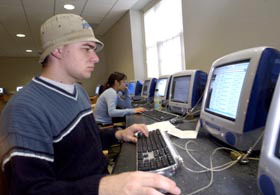|
This is an archived article.
For the latest news, go to the Advance
Homepage
For more archives, go to the Advance Archive/Search Page. | ||
|
Online
Registration Improving with Time
After some initial difficulties, the new Student Administration System steadily improved during its first few weeks of operation. As of Nov. 28, the new system, using PeopleSoft software, had enabled a total of 12,260 students at Storrs and the regional campuses to register online for spring semester classes.
"Secondly, because the system enforces prerequisites, many classes that closed out within minutes of the opening of registration in previous years still had open seats at the end of the week. This is an extremely important outcome if we are to reverse the trend of 'land-rush' activity at the opening of registration windows." Scott Coopee, director of the PeopleSoft project, says software problems and unanticipated levels of usage were at fault in the system's start-up. On the morning of Nov. 12, the day the system was launched University-wide, Coopee and his colleagues discovered that a piece of third-party software (not PeopleSoft) was enforcing a license restriction limiting some simultaneous functions. The copy of the software used to develop the PeopleSoft implementation had no such restriction. The usage limit was increased, but some time was lost. Coopee says the size of the computing hardware was appropriate for the numbers of students enrolling, but was strained to accommodate both enrolling students and those who were searching the system prior to enrollment, and this led to errors resulting from very slow response times. Juniors and seniors were advised to complete their registration during Thanksgiving week, and all other students were asked to change passwords and search for courses at that time, in preparation for the registration of first- through fourth-semester students, which began last week. The PeopleSoft Implementation Team will be carefully watching the system's performance when fewer sections remain open. "We believe this is when the function that allows students to search only those classes that have open seats will show its real value," says Kobulnicky. Dolan Evanovich, associate provost for enrollment management, believes the real value of the system will become more apparent over time. "Any time you implement a new system you expect that you will have to fine-tune it," he says. "We're doing just that right now. The system is working and will continue to get better as we learn more about it." Jeff von Munkwitz-Smith, university registrar, agrees: "No matter how much you 'tune' the system beforehand, you learn some things and have to make adjustments once the system is live and thousands of people start using it." He says student reaction to the new system has been encouraging. "I've heard very positive comments from students on the new approach to scheduling registration appointments. Instead of giving them a series of 10 short appointments, we now give them one open-ended appointment," he says. "And students can now register when it's convenient for them, rather than in a small window." Enforcement of prerequisites under the new system has also helped make registration more efficient. In the past, even though the catalog required students to have passed Biology 108, for example, in order to register for Biology 283, the system did not check to see if students had in fact done so. With the new system, some students have been blocked from enrolling in courses for which they had not taken the prerequisite course. This was most apparent with Management 290, the capstone course for management students, intended to be the last they take before graduation. Those enrolling in the course are required to have taken seven other specified business courses previously. "This fall, Management 290 was full - all seats were taken - 11 minutes after registration opened for the semester," he says. "Many of the students enrolled had not met the prerequisites; many students who had met the prerequisites couldn't get into the class because they had later registration times." Seats are still available in the class for spring, not because demand has gone down, but because the prerequisites are being enforced. Because of the difficulties the implementation of the new system has created for schools and departments, there will be a campus-wide debriefing on Wednesday, Dec. 5, from 3 to 5 p.m., in the Konover Auditorium of the Thomas J. Dodd Research Center. The PeopleSoft Team, including members of the Registrar's staff, the Graduate School, and technical staff will be on hand to listen and respond to people's experiences and suggestions. In January, the PeopleSoft Team will conduct sessions for those who use the system extensively to share their knowledge on how to use it, including techniques that make it work in particular offices or departments. At the end of this semester, the University will use the system to record grades. Although the grading function is relatively easy to use, the PeopleSoft Team will hold open sessions for people who would like assistance. Suzanne Zack |

